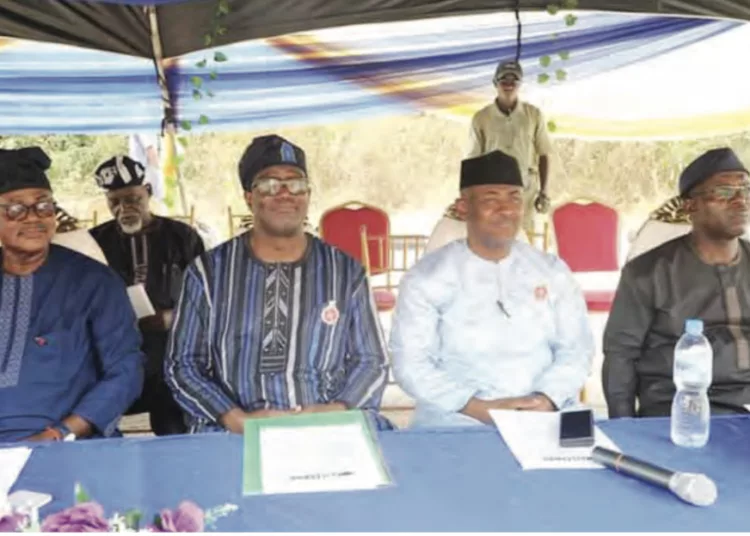The TETFund Alliance for Innovative Research (TETFAIR) recently wrapped up its inaugural edition of Research For Impact Initiative (R4i).
TETFAIR involved a series of intensive phases, starting with a bootcamp that kicked off a year ago with teams of academics from diverse Nigerian universities embarked on a journey that included prototype development, market validation, mentorship, entrepreneurship training, venture creation, and finally, prototype pitching.
R4i, a ground-breaking initiative of TETFund in collaboration with Innov8 Hub is aims to equip members of Nigerian academia from various public higher institutions with the necessary skills, processes and procedures needed to create innovative solutions from their research ideas, in order to tackle real-world challenges.
LEADERSHIP therefore, takes a look on a reflective journey as participants delved into the profound impact of TETFair in their lives.
They shared their transformative moments that defined their experience, creating a mosaic of insights that resonate with the essence of collaborative exploration and intellectual growth.
One of the participants, Professor Ernest-Bassey Etta Asikong
said his experience at Innov8 Hub and participation in the Research for Impact (R4i) initiative has convinced him, beyond reasonable doubt, that the Hub holds the needed solution for breakthrough in the development of indigenous technology in Nigeria and by extension in Africa.
He commended the entire management of Innov8 Hub for their golden opportunity to participate in the Research for Impact initiative, while appreciating TETFund for sponsoring the initiative.
Asikong promised to utilise the knowledge gained to facilitate indigenous technology development in Nigeria.
“Since our arrival, down to departure, we were treated to a highly coordinated management system that is close to perfection. The ambience of the environment, neatness, space management and natural ecosystem are very friendly and conducive for intense technological and academic exercises.
“More importantly, the human resources are extraordinarily amazing. All the resource persons and staff have demonstrated a high level of experience, expertise and capacity. The quality of their deliverables, especially the impactful sessions, were excellent.
“The time management was very efficient and effective, creating a check on both the participants and resource persons. There was also a high level of checks and balances on the coordinators, resource persons and other staff. Generally, the entire organization meets international best practices.
“Among special areas of interest for me were sessions on research commercialization, concept development, assumption testing, ideation, customer co-creation and prototype development. Other critical knowledge gained at R4i revolved around driving innovation through emotional intelligence, brainstorming, managing change as a change agent, public speaking using a teleprompter, intellectual property licensing, feasibility plan, identifying market opportunities and igniting innovation in my institution. The hands-on interface with the experts was also a great experience,” he added.
Also speaking, Professor Ayotunde Olutumininu Adebambo said he decided to turn his vision into reality by applying to TETFAIR alongside his Team, with their project “ANiMeDRig.”
According to him the innovation was an automatic, digital, non-invasive, animal measuring device that can optimize data collection and processing, for easier livestock management and decision-making
“My TETFAIR journey began out of necessity. The strain placed on animals, farmers and researchers during the routine measurement of the morphometric characteristics of poultry birds is intolerable.
“These measurements are crucial for making informed decisions on the growth, development, and health status of birds and the poultry business by extension. The archaic method of measurement with manual equipment is not only time-consuming but also invasive. It is evident that a change is required, and poultry bird measurements should be done using a non-invasive technique.
“At TETFAIR, we went through comprehensive processes and procedures of translating our ideas into innovation and enterprise. To gauge the importance and commercial viability of our project, we learnt how to emphasise the size and impact of the challenge we intended solving, using various search tools.
“Market validation was a crucial step, and we conducted surveys among commercial poultry farmers in Abeokuta and Ibadan. This confirmed the need for our device, as respondents expressed their eagerness to be patrons when ANiMeDRig is available in the market.
“The feedback from this phase also helped us fine-tune our prototype. TETFAIR emphasised how our device would contribute to the Sustainable Development Goals, particularly from the perspectives of SDGs 1, 2, and 8.”
He noted that during their journey through TETFAIR, they explored the art of pitching their product to prospective investors.
“One of the most significant breakthroughs came when AGRITED Nigeria Limited agreed to provide us with space for prototype testing on their farm and expressed interest in adopting our device once it is ready.
“We also received guidance on creating our business models from our innovation, focusing on both Business-to-Consumer (B2C) and Business-to-Business (B2B) approaches. In B2C, we engaged directly with our customers- commercial poultry farmers and researchers.
“We intend to sell the device to them, provide installation as well as offer subscription-based services. In recognition of the scarcity of poultry data and high demand from researchers and organisations, we aim to provide access to poultry farming data through our cloud database.
“At TETFAIR, we embarked on the process of registering our device as an Intellectual Property (IP). This decision was made after comprehensive capacity building on intellectual property rights, which confirmed our device’s eligibility for protection,” he added.





